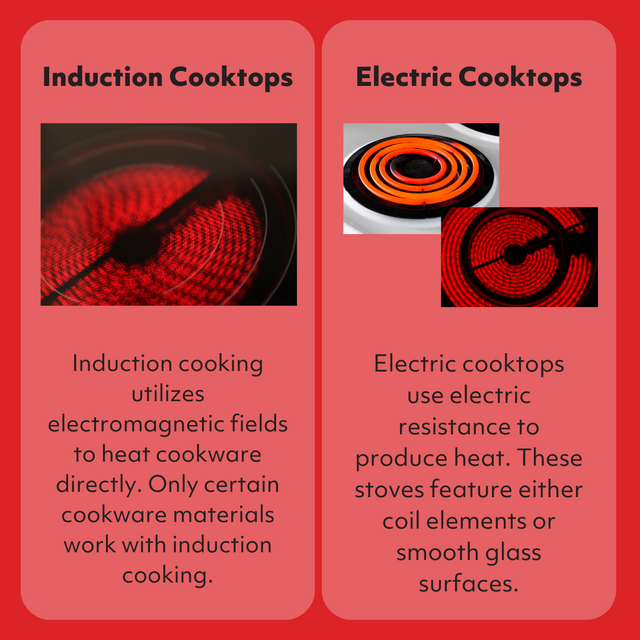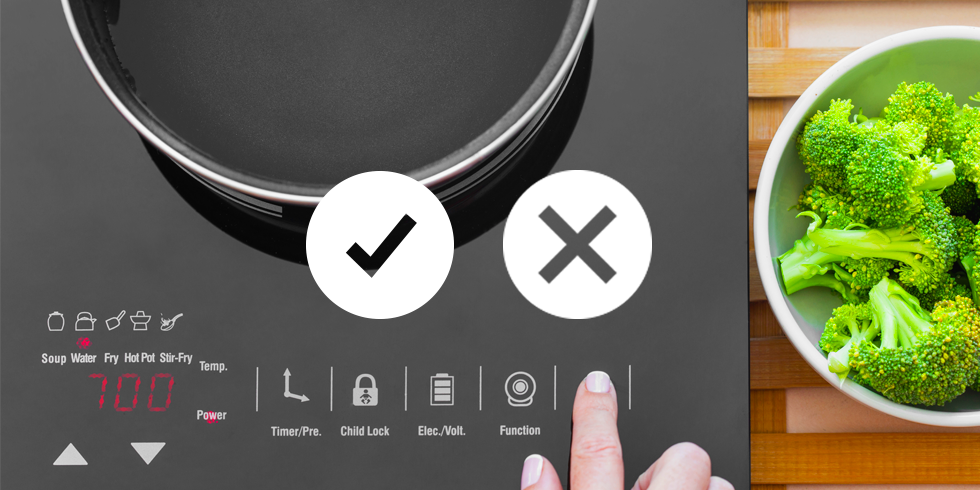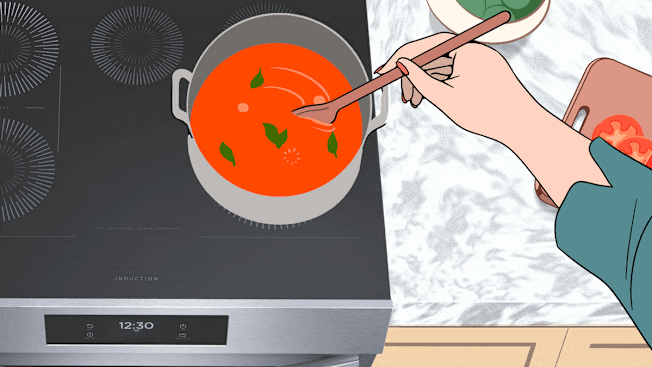Are you considering an upgrade to your kitchen with an induction cooktop but feeling uncertain about whether it’s the right choice for you? You’re not alone.
Many home cooks and culinary enthusiasts are weighing the benefits and drawbacks of this modern cooking technology. Induction cooktops promise rapid heating and energy efficiency, but they also come with their own set of challenges. In this post, we’ll delve into the pros and cons of induction cooktops, offering you a balanced perspective so you can make an informed decision.
By the end, you’ll know exactly what to expect and whether an induction cooktop fits your cooking style and needs. Ready to discover if this sleek appliance is the missing piece in your kitchen? Let’s dive in and find out!

Credit: www.friedmansappliance.com
Advantages Of Induction Cooktops
Induction cooktops heat quickly and use less energy, making them efficient for cooking. They are safer as they remain cool to touch and provide precise temperature control, enhancing cooking accuracy.
Induction cooktops have been gaining popularity in modern kitchens, and for good reason. They offer a host of benefits that can make your cooking experience more enjoyable and efficient. If you’re considering an upgrade, understanding these advantages can help you make an informed decision.Energy Efficiency
One of the standout features of induction cooktops is their energy efficiency. Unlike traditional gas or electric stoves, induction cooktops use electromagnetic energy to directly heat the pan. This means less energy is wasted, saving you money on your electricity bills. Have you noticed how your electric bill spikes after a month of heavy cooking? With induction, you can cook to your heart’s content without the financial guilt.Faster Cooking Times
Time is precious, and induction cooktops respect that. They heat up much quicker than their gas or electric counterparts, significantly reducing cooking times. Imagine preparing a quick dinner after a long day and not having to wait ages for the pot to boil. The efficiency of induction cooktops can transform your cooking routine, giving you more time to enjoy your meals and relax.Safety Features
Safety is a top priority in any kitchen, especially if you have kids around. Induction cooktops are safer because the surface itself doesn’t get as hot as traditional stoves. Ever accidentally brushed your hand against a hot stove? With induction, those risks are minimized. Additionally, many induction cooktops come with smart features like automatic shut-off and pan detection, adding an extra layer of security.Easy Cleaning
Cleaning up after cooking can be a daunting task, but induction cooktops make it easier. Since the surface remains relatively cool, food spills and splatters are less likely to get baked on. Have you ever spent ages scrubbing stubborn stains off a stove? With induction, a simple wipe down with a damp cloth can keep your cooktop looking pristine. This ease of cleaning can make your cooking experience more pleasant and less stressful. Induction cooktops offer a range of benefits that can enhance your kitchen experience. From energy savings to safety and ease of cleaning, they provide practical solutions to everyday cooking challenges. Have you considered how an induction cooktop could change the way you cook?Limitations Of Induction Cooktops
Induction cooktops require specific cookware, limiting options for users. They can be expensive compared to traditional stoves. Power outages can make them unusable, affecting cooking plans.
Induction cooktops have gained popularity for their efficiency and sleek design. However, they come with their own set of limitations that you might want to consider before making a purchase. These limitations can affect your cooking experience and budget, so it’s crucial to weigh them against the benefits. Let’s dive into the aspects that might make you think twice about choosing an induction cooktop.Initial Cost
Purchasing an induction cooktop can be a significant investment. They often come with a higher price tag compared to traditional gas or electric stoves. This initial cost might be a hurdle if you’re on a tight budget. However, if you’re planning a kitchen makeover, the modern look of induction cooktops might be worth the splurge.Compatibility With Cookware
Not all pots and pans will work on induction cooktops. They require cookware made of magnetic materials like cast iron or stainless steel. You might need to replace your favorite non-compatible cookware, adding to your expenses. Have you checked your current kitchenware collection?Learning Curve
Cooking on an induction cooktop is different from using gas or electric stoves. The heat adjusts quickly, which can be surprising if you’re used to slower temperature changes. It takes time to get accustomed to the precise control over heat. Are you ready to embrace the challenge?Power Requirements
Induction cooktops demand a good electrical setup. They often require a dedicated circuit due to their power consumption. If your kitchen isn’t equipped for this, you might face additional costs for electrical upgrades. Is your kitchen ready for this technology leap? Understanding these limitations is essential to make an informed decision. By considering factors like cost, cookware, learning curve, and power needs, you’ll be better prepared for a smooth transition to induction cooking.Comparing Induction And Traditional Cooktops
Choosing between induction and traditional cooktops can be challenging. Each offers unique benefits and drawbacks. Induction cooktops use electromagnetic fields to heat cookware. Traditional cooktops rely on gas or electric burners. Let’s explore how they compare in performance, cost, and safety.
Performance Differences
Induction cooktops heat quickly. They cook food faster than traditional methods. Heat is evenly distributed across the pan. Temperature control is precise and responsive. Traditional cooktops may take longer to heat. They provide a gradual cooking experience. Some prefer this for certain recipes.
Cost Analysis
Induction cooktops often have a higher upfront cost. They require compatible cookware. Energy efficiency can lead to savings over time. Traditional cooktops are generally less expensive to purchase. They do not require special pots or pans. Maintenance costs vary between the two.
Safety Comparisons
Induction cooktops are safer in many ways. Only the cookware gets hot, reducing burn risk. They automatically shut off when pots are removed. Traditional cooktops have exposed flames or hot elements. Risk of burns or gas leaks is higher. Safety features vary by model and brand.
Choosing The Right Cookware
Induction cooktops are efficient and sleek. They require specific cookware. Choosing the right pots and pans is crucial. Not all materials work on induction stoves. Your cookware must have magnetic properties. Let’s explore the options.
Material Considerations
Material matters for induction cooking. Stainless steel is popular. It is durable and often works well. Cast iron is another good choice. It heats evenly and retains heat. Copper and aluminum are not ideal. They need a magnetic layer. Check your cookware’s base for compatibility.
Induction-compatible Options
Some cookware is specially designed for induction. Look for the induction symbol. It ensures the pot is suitable. Many brands offer compatible sets. They often have a magnetic base. Test your current pots with a magnet. If it sticks, it’s likely compatible. Choose wisely for best results.
Maintenance Tips
Induction cooktops heat fast and are energy efficient, saving time and electricity. They can be expensive and require special cookware. Regular cleaning and avoiding scratches keep them in top condition.
Induction cooktops are gaining popularity due to their sleek design and energy efficiency. However, keeping them in top condition requires some care. Maintaining your induction cooktop not only ensures longevity but also keeps your cooking area hygienic and efficient. Let’s dive into some practical maintenance tips to help you get the most out of your appliance.Cleaning Practices
Regular cleaning is key to maintaining your induction cooktop. After each use, allow the cooktop to cool down, then wipe it with a soft, damp cloth to remove any spills or stains. For tougher spots, a mixture of vinegar and baking soda can work wonders. Avoid abrasive materials like steel wool, which can scratch the surface. Instead, opt for a soft sponge or microfiber cloth. It’s surprising how many people forget that simple dish soap can be effective for greasy residues. Have you tried using specialized glass cooktop cleaners? They can provide an extra shine and protect the surface from future stains. Make it a habit to clean your cooktop regularly to avoid buildup.Avoiding Damage
Prevention is better than repair. Always use cookware with a smooth base to prevent scratches. The contact between the pot and the cooktop is crucial for effective heating. Be mindful of the weight you place on the cooktop. Heavy pots can cause cracks or damage over time. Consider using lightweight cookware to minimize this risk. Think about how you handle your cookware. Sliding pots and pans can lead to scratches. Always lift them instead. If you’re a fan of cast iron, remember that it can be quite heavy and rough on the cooktop’s surface. Have you ever accidentally dropped something on your cooktop? Even small items like utensils can cause chips or cracks. Being cautious can save you from costly repairs. Incorporating these simple practices into your routine can keep your induction cooktop looking new and functioning efficiently. Isn’t it worth the effort to ensure your investment remains in pristine condition? What steps will you take today to care for your cooktop?Environmental Impact
Induction cooktops are gaining popularity for their eco-friendly features. They offer an efficient cooking solution with less environmental harm. Understanding their impact helps in making informed choices.
Energy Consumption
Induction cooktops use electromagnetic fields to heat pots directly. This process uses less energy compared to traditional stoves. The cooktop remains cool, reducing wasted heat. Less energy means lower electricity bills and reduced carbon footprint.
Sustainability Factors
Induction cooktops often have a longer lifespan than gas stoves. They require less maintenance, saving resources and reducing waste. Many models are made from recyclable materials, supporting sustainability goals. Choosing an induction cooktop contributes to a greener planet.
Consumer Considerations
When choosing an induction cooktop, several factors influence the decision. Understanding these can help in making an informed choice. Let’s explore important consumer considerations.
Budget Planning
Induction cooktops vary in price. Some are affordable, while others are costly. Setting a budget is crucial. Consider both initial costs and long-term savings. Induction cooktops use less energy. They can reduce electricity bills over time. Check for additional features. These can affect the price. Stay within your budget to avoid financial strain.
Lifestyle Fit
Consider your cooking habits. Induction cooktops heat quickly. This suits busy lifestyles. They are also safe. The surface stays cool, reducing burn risks. Families with children might prefer this. Evaluate your cookware. Induction requires compatible pots and pans. Plan for this investment if needed. Think about your kitchen space. Ensure the cooktop fits well in your setup.

Credit: www.goodhousekeeping.com

Credit: www.consumerreports.org
Frequently Asked Questions
What Are The Main Benefits Of Induction Cooktops?
Induction cooktops heat quickly and use less energy. They are safer and easier to clean. They offer precise temperature control.
How Does Induction Cooking Work?
Induction cooktops use electromagnetic fields. These fields directly heat the pan, not the cooktop surface. Efficient and fast.
Are Induction Cooktops Safe For Daily Use?
Yes, induction cooktops are safe. The surface doesn’t get hot, reducing burn risks. They shut off automatically when the pan is removed.
Do Induction Cooktops Require Special Cookware?
Yes, induction cooktops need magnetic cookware. Iron or steel pans work. Check for compatibility before buying.
Can Induction Cooktops Affect Pacemakers?
Some induction cooktops may interfere with pacemakers. Consult your doctor before use. Safety first.
Conclusion
Induction cooktops offer many benefits. Quick cooking and easy cleaning stand out. Safety features provide peace of mind. But they can be costly. Not all cookware works on them. Noise and power issues may arise. Weigh your needs carefully. Decide based on your lifestyle and budget.
This choice affects your kitchen experience. Consider all pros and cons before buying. An informed decision leads to satisfaction. Choose wisely for your cooking journey.





